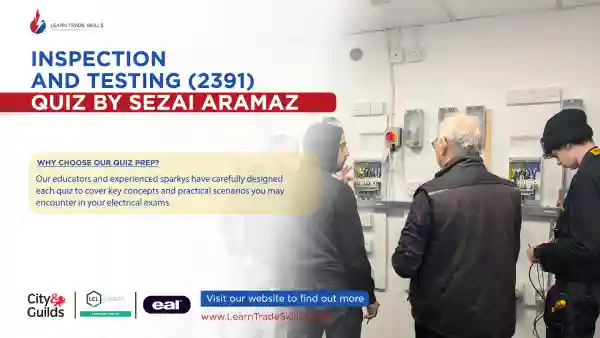

Let’s explore the pathways to becoming an electrician, the timeframes involved, and insights into the current electrician job market, both in the UK and specifically in Hertfordshire.
The shortest time to complete an electrician course is approximately 15 weeks, though this is usually limited to intensive full-time training programs. However, most individuals will take anywhere from 6 months to 3 years to gain full qualifications, depending on their chosen route and level of experience.
Here’s a breakdown of the main pathways to becoming an electrician:
If you’re starting from scratch or have no formal qualifications, this is the most comprehensive pathway. It includes foundational courses like the Level 2 and Level 3 Diplomas, 18th Edition Wiring Regulations, and NVQ Level 3 Electrical Installation. For those in Cheshunt, Hertfordshire, Learn Trade Skills offers flexible options tailored to your schedule.
This route is perfect for individuals who want to gain comprehensive qualifications and are prepared for a longer commitment to training.
For those focused on domestic electrical installations, this route provides the essential qualifications to certify your work and register with a Competent Person Scheme. It’s tailored for operatives already working in residential settings.
This domestic installer pathway is shorter and ideal for electricians who want to specialise in domestic settings while ensuring compliance with regulations.
If you have 5+ years of on-the-job experience but lack formal qualifications, this route helps you gain the credentials you need to achieve full certification.
This route is designed to fit around your work schedule, providing a flexible way to formalize your skills and gain industry recognition.
Absolutely! Age is not a barrier to starting an electrician course. Many programs, including those offered in Hertfordshire, are designed to support career changers, recognizing the value of prior life and work experience. The flexibility of part-time and online options makes it easier for mature learners to transition into the trade.
The difficulty of an electrician course depends on your prior knowledge and aptitude for technical subjects. While the courses cover complex topics like wiring regulations and electrical testing, they are designed to be accessible, with hands-on training and instructor support.
The cost of electrician courses in the UK varies significantly depending on the route, provider, and depth of training. Here’s a breakdown of typical prices for different routes, including VAT, based on our training centre.
Experienced Worker Route: £5,089.00 – Tailored for electricians with 5+ years of experience, this package formalizes existing skills and includes the NVQ Level 3 portfolio and relevant certifications.
Fully Qualified Route:
Standard Option: £8,599.00 – This comprehensive package is ideal for those starting from scratch and includes diplomas, NVQ Level 3 portfolio completion, and AM2 preparation.
Fast-Track Option: £7,099.00 – Designed for individuals with prior hands-on experience, this option combines in-centre training and online self-study.
Domestic Installer Route: £3,089.00 – Focused on those working in residential settings, this route covers essential qualifications to certify domestic electrical installations.
These prices reflect inclusive VAT costs, ensuring there are no hidden fees. The investment in an electrician course often pays off quickly, as qualified electricians in the UK can earn £32,000 to £40,000 annually, with even higher potential for specialists or self-employed professionals.
In the UK, electricians earn an average of £32,000–£40,000 per year, with experienced professionals and those in specialized fields earning significantly more. In Hertfordshire, the average electrician salary is slightly higher due to the higher cost of living and demand for skilled tradespeople.
The fastest route is the 15-week full-time training program included in the Fully Qualified Route. However, this still requires completing the NVQ portfolio, which takes about 1 year.
Yes, you can. Flexible courses like the Fast-Track Fully Qualified Route and the Domestic Installer Route allow you to gain the necessary qualifications without a traditional apprenticeship.
The demand for electricians in the UK remains high, driven by the transition to renewable energy systems, smart home technology, and ongoing housing developments. In Hertfordshire, areas like Cheshunt benefit from proximity to London, where the demand for skilled electricians pushes wages above the national average. Additionally, the rise in domestic renovations and energy-efficient installations presents lucrative opportunities for qualified electricians in residential settings.
Becoming an electrician is a rewarding career path with clear progression routes, flexible training options, and strong earning potential. Whether you’re in Cheshunt or elsewhere in Hertfordshire, there’s a course tailored to your needs. From beginners starting their first qualification to experienced workers seeking formal recognition, the journey to becoming a qualified electrician offers opportunities for all.
For those ready to take the next step, choosing the right route and provider is key. By understanding the timeframes and qualifications involved, you’ll be well-prepared to embark on this exciting career in the ever-growing electrical industry.
Sezai Aramaz is the esteemed founder of Learn Trade Skills, boasting over 40 years of experience in the electrical industry in the UK. With two decades dedicated to educating future electricians, he served as an Electrical Installation Lecturer and Assessor. Aramaz's expertise and commitment have contributed significantly to the growth and proficiency of aspiring tradespeople in the field.



© Copyright Learn Trade Skills 2025
“Lorem ipsum dolor sit amet, consectetur adipiscing elit. Ut pretium tristique purus nec consectetur. Nulla feugiat eget tellus aliquam scelerisque. Sed eget luctus enim, sed mattis enim. Lorem ipsum dolor sit amet, consectetur adipiscing elit. Ut pretium tristique purus nec consectetur. Nulla feugiat eget tellus aliquam scelerisque. Sed eget luctus enim, sed mattis enim.Nulla feugiat eget tellus aliquam scelerisque. Sed eget luctus enim, sed mattis enim. Lorem ipsum dolor sit amet, consectetur adipiscing elit. Ut pretium tristique purus nec consectetur. Nulla feugiat eget tellus aliquam scelerisque. Sed eget luctus enim, sed mattis enim.”
William Goss
Electrician course
11/11/2024